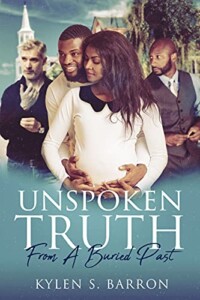Title: Unspoken Truth: From A Buried Past
Author: Kylen S. Barron
Publisher: BookBaby; 1st edition
ISBN: 978-1098385231
Pages: 158
Genre: Biography
Reviewed By: Dan MacIntosh
Read Book Review
Pacific Book Review
What makes evil people commit undeniable atrocities against innocent people? This is a question that’s oftentimes evaded humankind for ages. Yes, we recognize evil people when we see them. As the Biblical saying goes, ‘by their fruit ye shall know them.’ When someone beats a child bloody, as happens in Kylen S. Barron’s book, Unspoken Truth: From A Buried Past, all would agree that a clear ethical line has been crossed. This is not a spanking; this is, instead, pouring out wrath on a poor, defenseless child. We can many times agree on what is evil, but we can’t always explain why this evil was perpetrated.
Barron’s book tells the story of a woman named Shyrell. It’s a true story, and oftentimes a tough tale to process. It might hit a little too close to home for those that may have suffered childhood abuse at the hands of a parent. This book mainly delves on the ‘why’ question at hand. Of course, there is no justification for abusing any child. No ‘why’ is ever acceptable. Nevertheless, it’s difficult to imagine that a parent was simply born an abuser. Life circumstance drove the parent to a breaking point, somehow. This book is the story of one such bad parent.
Our story begins at the end of Shyrell’s mother’s life. While her mother is breathing her last breaths, Shyrell is trying to come to grips with the complicated relationship she has (and has had) with her mother. She loves her because she is, after all, her only mother. Children are taught to love their parents – no matter how good or bad they may be. The first part of this book finds Shyrell spending time with her mother, as well as visiting with relatives making that last pilgrimage to visit this dying woman while she’s still alive.
Along the way Shyrell takes on the role of amateur psychologist. Labeled an amateur, because she attempts to connect pivotal events in her mother’s past, with her eventual motherly failures. She uses the phrase, ‘hurt people, hurt people’ at one point. In other words, people who have been hurt – and hurt badly – many times hurt other people, much the same way they had been hurt. Shyrell’s mother must have abused her because she herself been badly hurt in the past. No normal past could ever producer such a motherly evil doer.
Shyrell deduces that the main cause of her mother’s evil behavior boils down to a family secret. It’s a secret her mother takes with her to her grave, even though she drops hints about this secret on her deathbed. (It would be a spoiler to disclose the circumstances of this secret.)
Barron’s book exposes the raw nerves of family relationships. It evidences how the death of a family member can sometimes bring out the worst in family members. It also grapples with the many times elusiveness of the ‘closer’ concept when it comes to mourning the death of a loved ones. This story suggests there can never be full closure whenever there are unexplained family secrets. It also highlights the dangers of family secrets. What some people do to protect themselves by keeping secrets, actually other people – a lot, yet, the secretive will be secretive, and cannot be forced to be honest sometimes.
The very thought of attempting to bury the past, is a Poe-ian concept, at best. Much like that telltale heart in one of his famous stories, it’s oftentimes impossible to completely bury the past and take a secret to the grave. Unspoken truth, at least in this case, was eventually spoken. Shyrell isn’t healed by knowing some of the ‘whys’ of her family’s past, but at least she’s not left in pain AND without verifiable answers. If there’s a moral to this story, it’s that we should all do our best to never lie or keep family secrets. The truth will set you free but lies always cause pain – without exception.


